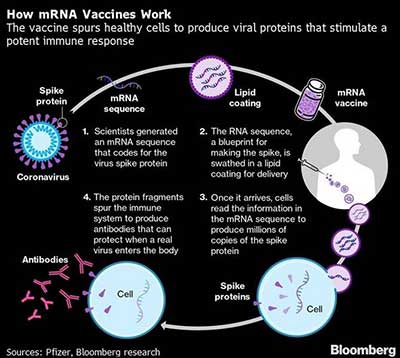Relevance: GS-3: Science and technology- developments and their applications
Key Phrases: mRNA based vaccines, cytoplasm, ribosome, transcription, translation, spike protein, fermentation processes, regenerative medicine, genome sequencing, gene editing technology
Why in News?
- The rapid development of multiple covid-19 mRNA based vaccines has opened the gateway for diversification of mRNA based therapies.
- Scientists believe that in the next 15 years, more than one-third of all newly approved drugs will be based on mRNA science.
What is mRNA ?
- Messenger RNA (mRNA) is a single-stranded RNA molecule that is complementary to one of the DNA strands of a gene.
- The mRNA is an RNA version of the gene that leaves the cell nucleus and moves to the cytoplasm where proteins are made.
- During protein synthesis, an organelle called a ribosome moves along the mRNA, reads its base sequence, and uses the genetic code to make proteins.
What do mRNA based therapies do?
- mRNA produces instructions to make proteins that may treat or prevent disease.
- mRNA medicines aren’t small molecules, like traditional pharmaceuticals.
- Instead, mRNA medicines are sets of instructions. And these instructions direct cells in the body to make proteins to prevent or fight disease.
Working mechanism of mRNA based therapies

- Through a process known as transcription, an RNA copy of a DNA sequence for creating a given protein is made.
- This copy – mRNA – travels from the nucleus of the cell to the part of the cell known as the cytoplasm, which houses ribosomes. Ribosomes are complex machinery in the cells that are responsible for making proteins.
- Then, through another process known as translation, ribosomes ‘read’ the mRNA, and follow the instructions, creating the protein step by step.
- The cell then expresses the protein and it, in turn, carries out its designated function in the cell or the body.
What is the mRNA vaccine?
- Such vaccines make use of the messenger RNA molecules that tell the body’s cells what proteins to build.
- The mRNA, in this case, is coded to tell the cells to recreate the spike protein of the coronavirus SARS-CoV-2, which causes Covid-19.
- It is the spike protein- which appears as spikes on the surface of the coronavirus- that initiates the process of infection; it allows the virus to penetrate cells, after which it goes on to replicate.
- A coronavirus vaccine based on mRNA, once injected into the body, will instruct the body’s cells to create copies of the spike protein.
- In turn, this is expected to prompt the immune cells to create antibodies to fight it.
- These antibodies will remain in the blood and fight the real virus if and when it infects the human body.
Huge benefits of mRNA based therapies
- Rather than relying on complex and time-consuming fermentation processes to produce drugs, mRNA therapies instead turn the recipient’s own cells into drug factories.
- The development of covid-19 vaccines based on mRNA has proved the efficacy and safety of this approach in preventing infectious diseases. The fact that a safe and effective vaccine could be developed in less than 12 months.
- Many existing vaccines for many diseases might be reformulated using mRNA, making them more efficient.
- Challenging health problems, such as age-related diseases in developed countries and the growing need for affordable primary health-care in low-income countries. These can be conquered only by the individualisation of treatment and targeting of rare diseases. These needs can be perfectly addressed by mRNA.
- The rich toolbox of mRNA technologies includes an increasingly diversified portfolio of mRNA formats, some with the ability to multiply in cells, and a plethora of ways to deliver mRNA to different organs and cells in the body
- In the future, mRNA drugs could be used for individualised cancer therapies, regenerative medicine, and for a wide variety of diseases such as allergies, autoimmune conditions and inflammatory diseases.
Limitations in mRNA therapies use
- mRNA therapies based skills are in short supply such as modeling expertise, trained researchers and technological hardware such as high computational capacity and labs.
- Sharing of genome sequencing information, vital for mRNA therapies, for faster development is fraught with regulatory as well as ethical issues like privacy.
- Monopolisation of mRNA based technologies by few global companies like Moderna, Plitzer is curtailing its expansion.
- Security threats from state or non-state actors pose danger as the mRNA technology can be used with gene editing technology to modify pathogens for use in biological warfare.
Mains Question:
Q. As it is said during covid pandemic, 'there is no one
safe until all are safe'. In this context, analyze the significance of mRNA
based interventions in pandemic control.
(10 marks)
Source: The Economist







